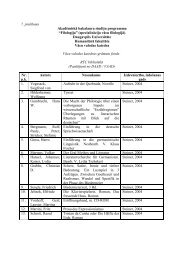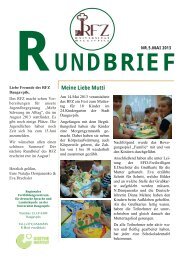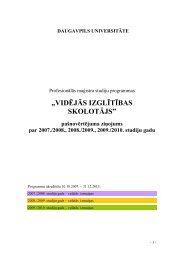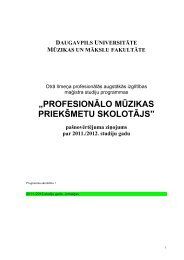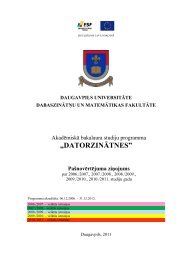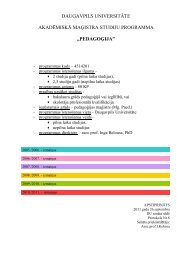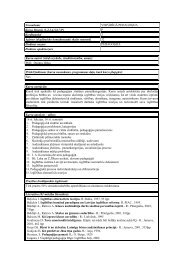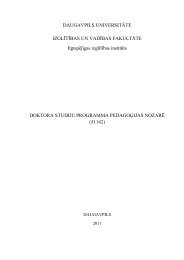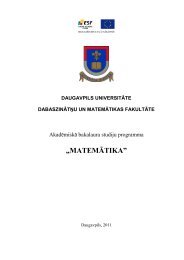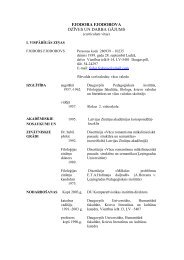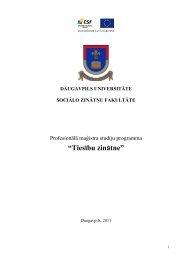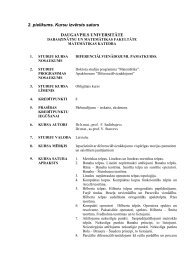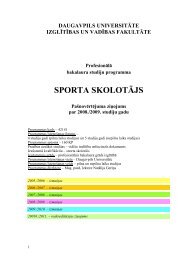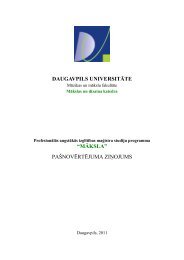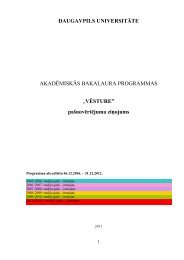- Page 1 and 2:
DAUGAVPILS UNIVERSITĀTE IZGLĪTĪB
- Page 3 and 4:
SATURS Ievads …………………
- Page 5 and 6: kopš 2005. gada Zalcburgas “Bolo
- Page 7 and 8: iekšējās kvalitātes prasības u
- Page 9 and 10: Doktorantam ir jāizmanto programm
- Page 11 and 12: 2008. gadā vairāki partneri palī
- Page 13 and 14: kopš 2008. gada ELSEVIER bibliogr
- Page 15 and 16: Pedagoģijas doktora programmai ir
- Page 17 and 18: Sustainable Development: 4th Intern
- Page 19 and 20: Materials. St.Peterburg, April 24-2
- Page 21 and 22: Implementation of Education for Sus
- Page 23 and 24: Zariľa, S., Belousa, I. (2009). Re
- Page 25 and 26: Basko, J., Volodko-Mitina, K. (2010
- Page 27 and 28: Scientific Conference of Daugavpils
- Page 29 and 30: Eiropas Savienības doktorantūras
- Page 31 and 32: akadēmisko rakstu sagatavošanai,
- Page 33 and 34: salīdzināšanai ar Eiropas un DU
- Page 35 and 36: Latvijas Augstskolu pedagogu sadarb
- Page 37 and 38: education by nonformal learning”
- Page 39 and 40: 8. starptautiskā JTEFS/BBCC konfer
- Page 41 and 42: International Symposium of the Inte
- Page 43 and 44: (“Transfer of innovative methodol
- Page 45 and 46: Shaping Global Issues” Starptauti
- Page 47 and 48: aksturīgas Eiropas Savienības val
- Page 49 and 50: 1.pielikums Programmas saturs, stud
- Page 51 and 52: Skolas pedagoģijas apakšnozarē *
- Page 53 and 54: Nosaukums Promocijas darba struktū
- Page 55: Загвязинский, В.И.,
- Page 59 and 60: 1. Ievads kursā “Kvalitatīvā p
- Page 61 and 62: Kursa anotācija angļu valodā: Th
- Page 63 and 64: Kursa plāns: 1. Iepazīšanās ar
- Page 65 and 66: of the course, students conduct pra
- Page 67 and 68: 6. Teorētisko pieeju identificēš
- Page 69 and 70: Nosaukums Kursa līmenis (1,2,3,4,5
- Page 71 and 72: Literatūra (02-ieteicamā): Palmer
- Page 73 and 74: Nosaukums Kursa līmenis (1,2,3,4,5
- Page 75 and 76: 1. Ţogla, I. Didaktikas teorētisk
- Page 77 and 78: Nosaukums Mūsdienu psiholoģijas p
- Page 79 and 80: Crain, W. (2000). Theories of Devel
- Page 81 and 82: Nosaukums Kursa līmenis (1,2,3,4,5
- Page 83 and 84: Corcoran, P.B., Wals, A. E., Ed. (2
- Page 85 and 86: Nosaukums Mācīšanas psiholoģija
- Page 87 and 88: 11. Smita, K., & Strika, L. (1998).
- Page 89 and 90: Nosaukums Pētnieka identitātes at
- Page 91 and 92: Armstrong, P. (2001) Becoming and b
- Page 93 and 94: Nosaukums Mācību vides attīstīb
- Page 95 and 96: Kursa nosaukums angļu valodā: Pro
- Page 97 and 98: Pozitīvas mācību vides radīšan
- Page 99 and 100: Nosaukums Skolotāja kompetences pr
- Page 101 and 102: 8. Выготский Л.С. Про
- Page 103 and 104: Nosaukums Kursa līmenis (1,2,3,4,5
- Page 105 and 106: Literatūra (03-ieteicamā periodik
- Page 107 and 108:
modelis un jēgpilnas mācīšanās
- Page 109 and 110:
Kursa anotācija angļu valodā: Th
- Page 111 and 112:
2. Dabaszinātnes un dzīves kvalit
- Page 113 and 114:
Kursa nosaukums Kursa līmenis (1,2
- Page 115 and 116:
Kādām studiju programmām un to d
- Page 117 and 118:
1. Vizuālās mākslas pedagoģijas
- Page 119 and 120:
Meikšāne Dz. (1998). Psiholoģija
- Page 121 and 122:
Nitko, Anthony J. (2004). Education
- Page 123 and 124:
Nosaukums Kursa līmenis (1,2,3,4,5
- Page 125 and 126:
Music Education, 23, 3, pp. 205-216
- Page 127 and 128:
Nosaukums Mākslas psiholoģija Kur
- Page 129 and 130:
Literatūra (03-ieteicamā periodik
- Page 131 and 132:
Nosaukums Kursa līmenis (1,2,3,4,5
- Page 133 and 134:
Šuvajevs I. (1996). Psihoanalīze
- Page 135 and 136:
Creativity Research Journal, 2000-2
- Page 137 and 138:
Nosaukums Kursa līmenis (1,2,3,4,5
- Page 139 and 140:
Geske A. (2001) "Datortehnoloģijas
- Page 141 and 142:
Mācību grāmatas vēsturiskā ska
- Page 143 and 144:
Nosaukums Kursa līmenis (1,2,3,4,5
- Page 145 and 146:
145
- Page 147 and 148:
Izglītības darbības pētījums u
- Page 149 and 150:
Salite, I., (2006) Aim of education
- Page 151 and 152:
Nosaukums Zinātnisko publikāciju
- Page 153 and 154:
Literatūra (03-ieteicamā periodik
- Page 155 and 156:
16. Rudīte Grabovska Dr.ped. Docen
- Page 157 and 158:
Dr.ped.‟93 un LPA” koordinatore
- Page 159 and 160:
project; starptautiskā mākslas zi
- Page 161 and 162:
J.Davidova Dr.ped.„97 kopš 2005.
- Page 163 and 164:
A.Pipere 2005-2007.g. “Doktorant
- Page 165 and 166:
I.Jurgena Dr.ped. finansētajā pro
- Page 167 and 168:
I.Belousa Phd sagatavošana” 2001
- Page 169 and 170:
Dz.Iliško Phd ES Comenius 2.1 proj
- Page 171 and 172:
I.Mičule Phd 2006.-2007.g. Skolot
- Page 173 and 174:
SOCRATES programmas Comenius 2.1. p
- Page 175 and 176:
Pamattdarbā strādājošo docētā
- Page 177 and 178:
A.Šļahova Dr.ped.‟93 J.Davidova
- Page 179 and 180:
A.Pipere Dr.psih.‟93 I.Kokina Dr.
- Page 181 and 182:
Dr.ped. V.Makarevičs Dr.psih. I.Be
- Page 183 and 184:
I.Mičule Phd R.Grabovska Dr.ped. 2
- Page 185 and 186:
Doktorantūras programmā Daugavpil
- Page 187 and 188:
Doktorantūras programmā Daugavpil
- Page 189 and 190:
2.pielikums Studējošie Pedagoģij
- Page 191 and 192:
Šajā studiju gadā viens studējo
- Page 193 and 194:
N. p.k. Nepilna laika studijas 2007
- Page 195 and 196:
N. p.k. Nepilna laika studijas Vār
- Page 197 and 198:
18. Dzintra Guļāne Ilgtspējības
- Page 199 and 200:
DAUGAVPILS UNIVERSITĀTES PEDAGOĢI
- Page 201 and 202:
4.1.2. promocijas darbu 2 eksemplā
- Page 203 and 204:
6.1.9. vai pretendents veicis kādu
- Page 205 and 206:
uzdot promocijas padomei mēneša l
- Page 207 and 208:
8.15. Sēdes gaitu protokolē PPP s
- Page 209 and 210:
Doktoranti un pretendenti, kuriem i
- Page 211 and 212:
DAUGAVPILS UNIVERSITĀTE IZGLĪTĪB
- Page 213 and 214:
3.8. Ārējie sakari...............
- Page 215 and 216:
Pētniecības attīstība pedagoģi
- Page 217 and 218:
Teorētiskie semināri 2.,3.,4.,5.
- Page 219 and 220:
apakšnozarē *Holisma teorija skol
- Page 221 and 222:
Brīvā izvēle *Mūzikas pedagoģi
- Page 223 and 224:
II-III studiju gads Pētījuma turp
- Page 225 and 226:
saistība skolotāju sagatavošanā
- Page 227 and 228:
ZA zinātnisko, IZM lietišķo pēt
- Page 229 and 230:
projektā “Uzdrīkstēšanās”
- Page 231 and 232:
J.Davidova Dr.ped.„97 1999. dalī
- Page 233 and 234:
2000.g. dalībniece XXIII Starptaut
- Page 235 and 236:
Līdzdalība starptautiskajās konf
- Page 237 and 238:
A.Šļahova Dr.ped.‟93 J.Davidova
- Page 239 and 240:
I.Kokina Dr.psih.‟ 96 2000.Muncij
- Page 241 and 242:
o Iesaistīšanās Erasmus projekt
- Page 243 and 244:
2. 2003./4. studiju gada pašnovēr
- Page 245 and 246:
organizēšanai grupās (kursos). P
- Page 247 and 248:
2003./4. studiju gadā vairāk veic
- Page 249 and 250:
Ar labām zināšanām 17.11.03. 17
- Page 251 and 252:
tēmām grupa 15.00 Akadēmiska dis
- Page 253 and 254:
DU IVF III Doktorantūras I kursa (
- Page 255 and 256:
29.11.03. 15.00 Izglītības filoso
- Page 257 and 258:
Education in Latvia Transition: The
- Page 259 and 260:
Izglītības iniciatīvu centra sta
- Page 261 and 262:
Tēzes starptautiskajās zinātnisk
- Page 263 and 264:
Education and Training” DU starpt
- Page 265 and 266:
Obligātās izvēles kursi apakšno
- Page 267 and 268:
Studiju plāns tika veidots atbilst
- Page 269 and 270:
Pedagoģijas un psiholoģijas fakul
- Page 271 and 272:
kā personiskais pieprasījums pēc
- Page 273 and 274:
02.03.04. 15.00 Akadēmiska diskusi
- Page 275 and 276:
17.09.04. 15.00 Kvantitatīvā pēt
- Page 277 and 278:
2000. gads; 2001. Skolēnu mācību
- Page 279 and 280:
ASV, 2000.; Helsinki, Somija, 2000.
- Page 281 and 282:
4. numuram: 23 locekļi no ASV, Vā
- Page 283 and 284:
modernismā un postmodernismā. Kop
- Page 285 and 286:
2005./6. studiju gadā tika piedāv
- Page 287 and 288:
2005./6. studiju gadā doktora prog
- Page 289 and 290:
Valsts budţeta līdzekļi, maksas
- Page 291 and 292:
10. VI Promocijas eksāmens svešva
- Page 293 and 294:
7.I 9.00 Teorētiskais seminārs (I
- Page 295 and 296:
5.2.Studiju programmas struktūra S
- Page 297 and 298:
Studiju programmas realizācija Izm
- Page 299 and 300:
Absolventu un darba devēju aptauja
- Page 301 and 302:
DAUGAVPILS UNIVERSITĀTE IZGLĪTĪB
- Page 303 and 304:
N.p. k. Vārds, uzvārds Akadēmisk
- Page 305 and 306:
1994.g. doc., Sākumskolas metodika
- Page 307 and 308:
2007. gada 7. - 11. janvārim pieda
- Page 309 and 310:
2001. gada 11.-14. decembris 3. ikg
- Page 311 and 312:
I. VISPĀRĪGĀS ZIŅAS Anita Piper
- Page 313 and 314:
A Qualitative Meta-Analysis of Sust
- Page 315 and 316:
2006. 24.-26.08. Daugavpils Univers
- Page 317 and 318:
III. PEDAGOĢISKĀ DARBĪBA (pēdē
- Page 319 and 320:
Cits Grāmatas “Kā izaudzināt b
- Page 321 and 322:
VĀRDS, UZVĀRDS JEĻENA DAVIDOVA C
- Page 323 and 324:
I. ZINĀTNISKĀ DARBĪBA KONFERENCE
- Page 325 and 326:
Davidova J., 2005. 28.-29. oktobris
- Page 327 and 328:
Davidova J., 2003. 8.-9.maijs (Klai
- Page 329 and 330:
Davidova J., 2001. 31.jūlijs -4. a
- Page 331 and 332:
Starptautiskā zinātniski metodisk
- Page 333 and 334:
Zinātniskā konference „Kultūra
- Page 335 and 336:
Starptautiski recenzēti izdevumi E
- Page 337 and 338:
Kokina I., Davidova J. (2007) Intel
- Page 339 and 340:
Davidova, J. (1996) J. A. Komenskis
- Page 341 and 342:
2002. gads - Mūzikas pedagoģijas
- Page 343 and 344:
Mūsdienu mūzikas pedagoģijas att
- Page 345 and 346:
2005. g. 21. - 25. aprīlis, lekcij
- Page 347 and 348:
1998. g. 20 - 21. novembris - Starp
- Page 349 and 350:
Kopš 2000. gada - DU Pedagoģijas
- Page 351 and 352:
3786 12. Jurgena I. Audzināšanas
- Page 353 and 354:
CURRICULUM VITAE Blaumaľa 6 - 8, K
- Page 355 and 356:
Krastiľa E.2002.g. 23.-25. maijs p
- Page 357 and 358:
11. Математика для 1
- Page 359 and 360:
8. Krastiľa E., Locmele I. (2006.)
- Page 361 and 362:
DU Senāta locekle 2002. - 2007. IV
- Page 363 and 364:
Darba pieredze 1993.- DPU Dabaszin
- Page 365 and 366:
Aleksandra Šļahova Dzimusi 1948.g
- Page 367 and 368:
Development of Creative Activity /
- Page 369 and 370:
Teaching Methods Development in Vis
- Page 371 and 372:
RSU Sociālo zinātľu doktora prog
- Page 373 and 374:
2001.g.- 2 darbi: o Jolanta Savvina
- Page 375 and 376:
2.6. Mācību grāmatu un mācību
- Page 377 and 378:
2006.g. 7.-8. decembris - starptaut
- Page 379 and 380:
Journal of Teacher Education and tr
- Page 381 and 382:
26. Олимпиада в учил
- Page 383 and 384:
61. Проблемы теории
- Page 385 and 386:
Vārds, uzvārds: ALEKSEJS VOROBJOV
- Page 387 and 388:
5. Vroclavas universitātes Psiholo
- Page 389 and 390:
Kvantitatīvās metodes sociālpsih
- Page 391 and 392:
Zinātnisko izdevumu redakcijas kol
- Page 393 and 394:
1963. - 1976.g. - DPI Agrobioloģis
- Page 395 and 396:
LU profesoru padomes pedagoģijā p
- Page 397 and 398:
1994.g. - 1995.g., ārpusklases dar
- Page 399 and 400:
4.1.2.4. Belousa, I., 2007.g. 4.-6.
- Page 401 and 402:
4.1.6. Eksperta darbība Latvijas Z
- Page 403 and 404:
4.2.6.6. Belousa, I., 2002.g. 20. s
- Page 405 and 406:
4.3.3.1. Belousa, I., kopš 2008.g.
- Page 407 and 408:
CURRICULUM VITAE DZINTRA ILIŠKO Dz
- Page 409 and 410:
Iliško, Dz. (2006). Teacher‟s id
- Page 411 and 412:
ecological and cultural crises of o
- Page 413 and 414:
Starptautiskā konference “Citize
- Page 415 and 416:
Iliško Dz. 2003. g. 23. augusts (R
- Page 417 and 418:
Iliško, Dz. Līdzdalība ES Comeni
- Page 419 and 420:
ISEC finansēto pedodoģiski profes
- Page 421 and 422:
un augstskolu sadarbības modeļu i
- Page 423 and 424:
iedrs (full time member) Iliško, D
- Page 425 and 426:
1990. g. Daugavpils pilsētas Tauta
- Page 427 and 428:
Kokina I. 1999. g. oktobrī - pieda
- Page 429 and 430:
Davidova, J. & Kokina, I. (2006) La
- Page 431 and 432:
Davidova, J. & Kokina, I. (2002) Da
- Page 433 and 434:
Kokina I. (1994) Es - pasaulē prob
- Page 435 and 436:
metodes pedagoģijā - 2 KP lekciju
- Page 437 and 438:
I. Kokina Psiholoģija skolā. Soro
- Page 439 and 440:
2002. gada 9.-14.oktobrī piedalī
- Page 441 and 442:
Augstskolas, fakultātes, institūt
- Page 443 and 444:
for the Decade of Education for Sus
- Page 445 and 446:
9. Salīte, I., Klepere, R. (2003)
- Page 447 and 448:
2. Grabovska, R., 2006.g. 27. - 28.
- Page 449 and 450:
1. PIEDALĪŠANĀS KONFERENCĒS Mak
- Page 451 and 452:
Makarevičs V. 1997. 21.-24 jūnijs
- Page 453 and 454:
Makarevičs, V. (2001) Modern psych
- Page 455 and 456:
Attīstības psiholoģija Pedagoģi
- Page 457 and 458:
2007.g. septembris - Daugavpils uni
- Page 459 and 460:
Salite, I., Micule, I., Kravale, M.
- Page 461 and 462:
-- Angļu valoda (2006./2007. st.g.
- Page 463 and 464:
1. Vārds: Svetlana 2. Uzvārds: Ig
- Page 465 and 466:
7. Līdzdalība pētnieciskos proje
- Page 467 and 468:
IRĒNAS ŢOGLAS I. Vispārīgās zi
- Page 469 and 470:
) trīs publikācijas recenzētos i
- Page 471 and 472:
Zinātniskais vadītājs Latvijā E
- Page 473 and 474:
Galvenie pienākumi Datums: no (mm/
- Page 475 and 476:
8.14. Atis Kapenieks, Marite Kirkov
- Page 477 and 478:
1999 Leonardo da Vinci Technology,
- Page 479:
479



